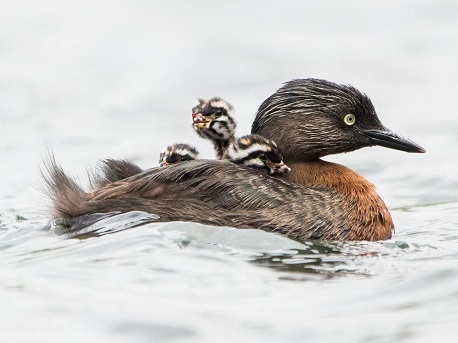Avian specialist discovers new grebe chicks
Aimee Wilson
21 February 2024, 4:30 PM
 Avian Rescue Otago owner Alan Parker with ‘Swanona’ the black swan he rescued from a highway near Timaru. PHOTO: Supplied
Avian Rescue Otago owner Alan Parker with ‘Swanona’ the black swan he rescued from a highway near Timaru. PHOTO: SuppliedA breeding pair of grebes have been spotted with a new chick at a boat ramp near the Clyde Dam, causing much excitement for avian specialist Alan Parker.
The Avian Rescue Otago owner, who is based in Alexandra, said his biggest concern was keeping the grebes safe, as it was near a popular swimming spot where boats were coming and going.
Alan has contacted the Department of Conservation that were working on a plan to keep them safe - including erecting signage, as it was rare for them to breed successfully, and they hadn’t for years.
The pair have been living at the site since about 2020, and there were also quite a few at Butchers Dam, along with McNulty Inlet in Cromwell.
Alan has made many rescues of grebes, and they are one of the only bird species that carry their young on their back while swimming.
“The young will stay holding on even when their parents are diving for food.”
Grebes were not set up for walking on land for long periods of time, and many of his rescues have involved birds that have ended up in people’s gardens or been poisoned by lead fishing sinkers and other waste.
Alan was awarded the ASB Good as Gold award worth $4000 back in 2022 for his rescue work, but his rehabilitation clinic receives no other funding and is largely a volunteer role.
The qualified general practice veterinarian nurse with advanced avian bird care training from the UK, will travel throughout the South Island to make rescues - sometimes receiving multiple calls each day.

A mother with her three baby grebes on her back (supplied).
His intensive care units have their own oxygen supply enabling him to carrying out tube feeding for sick birds, and he often takes in owls, hawks, falcons and ruru (morepork).
“People often pick them up at night on the road.”
Owls are his favourite, “each and every one has a different personality and brings an interesting challenge,” he said.
Success rates are often high with little owls - above 90 per cent, but the survival and release rates of other birds are usually around 80 per cent.
“I have a rule of not naming any for two weeks until I know they will survive,” he said.
His latest love is ‘Swanona’ - a black swan that was found with head injuries by a motorist near Timaru two weeks ago.
The Dunedin Wildlife Hospital also caters for sick and injured birds in the South Island.

NEWS
JOBS
WHAT'S ON






